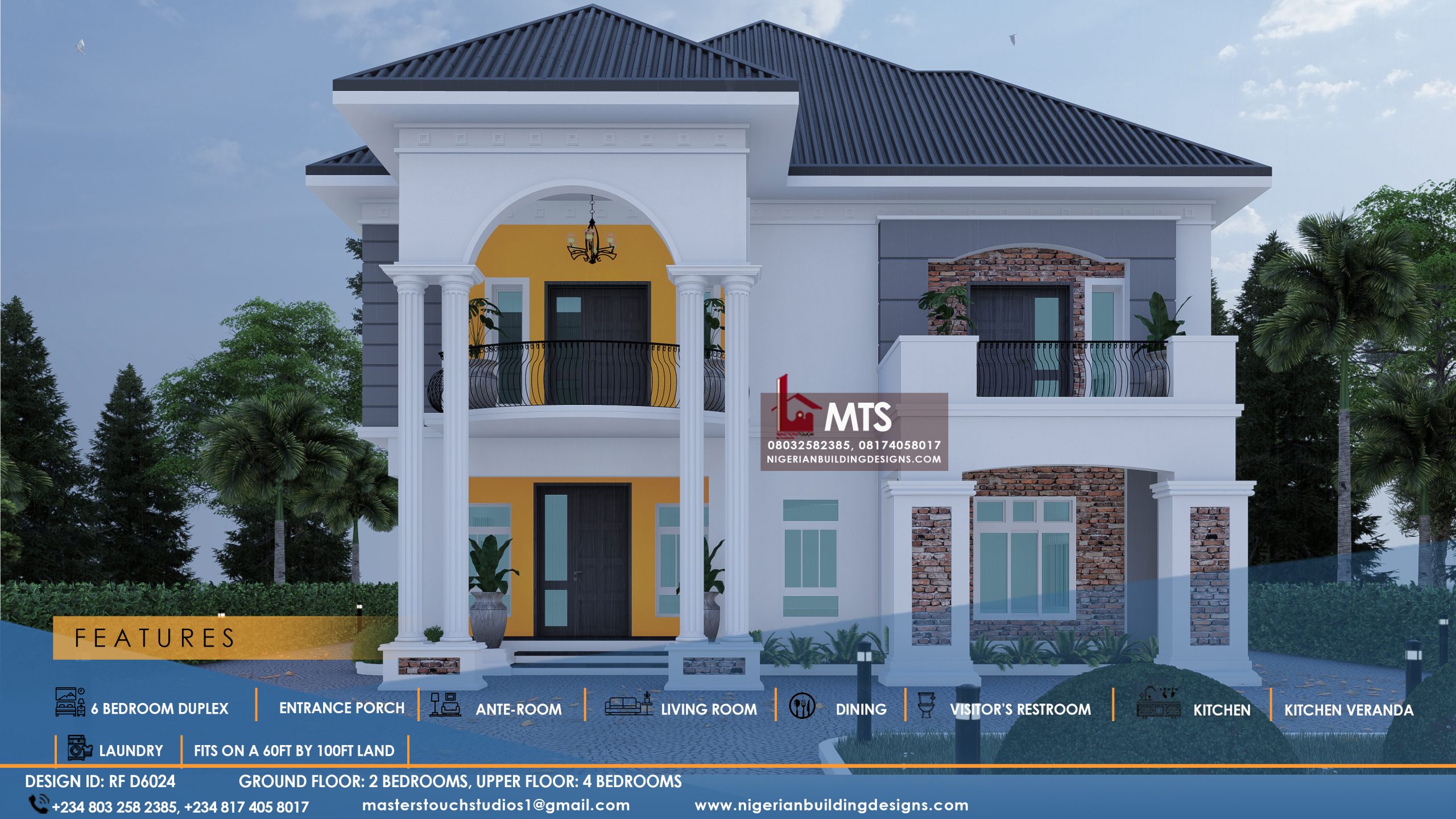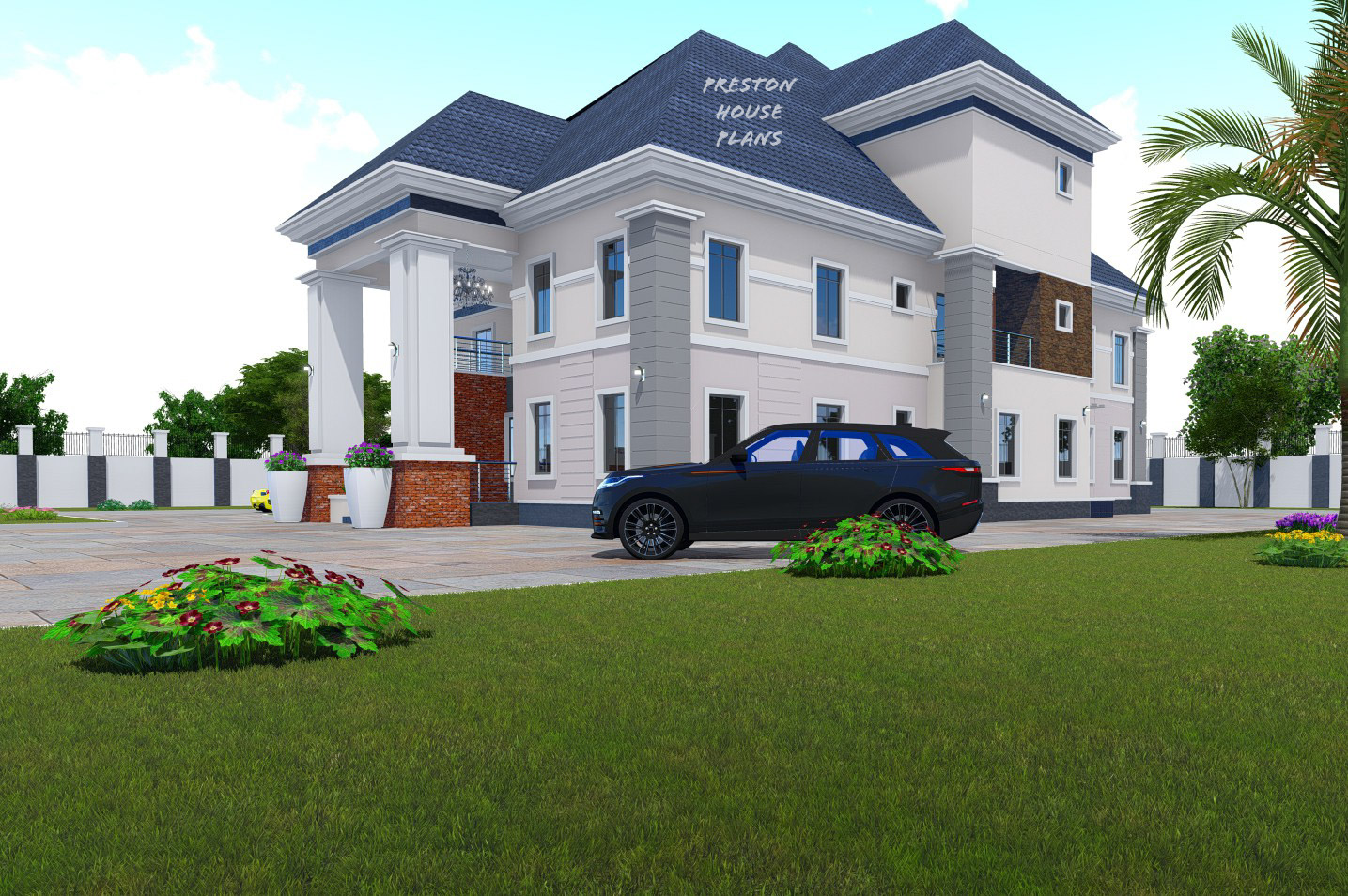The Growing Demand for Spacious Homes in Nigeria: 6 Bedroom House Plans In Nigeria

The Nigerian housing market is experiencing a surge in demand for larger homes, particularly those with six bedrooms or more. This trend reflects a complex interplay of socio-economic factors, shifting lifestyle preferences, and burgeoning investment opportunities.
Factors Driving the Demand for 6-Bedroom Homes, 6 bedroom house plans in nigeria
The demand for spacious homes in Nigeria is driven by a confluence of factors, including:
- Increasing Family Sizes: Nigeria has a young and growing population, with a high fertility rate. Families are expanding, requiring larger homes to accommodate multiple generations living together. According to the National Bureau of Statistics, the average household size in Nigeria is 4.8 people.
- Growing Middle Class: The Nigerian middle class is expanding rapidly, fueled by economic growth and urbanization. This segment of the population has disposable income and is increasingly seeking comfortable and spacious living environments. A 2019 report by the African Development Bank estimated that the Nigerian middle class accounted for 35% of the population.
- Shifting Lifestyle Preferences: Modern lifestyles are placing a premium on space and privacy. Families are seeking homes with dedicated spaces for work, entertainment, and leisure. The demand for home offices, gyms, and entertainment rooms has contributed to the preference for larger homes.
- Investment Opportunities in Real Estate: Real estate in Nigeria has emerged as a lucrative investment avenue. Investors are attracted to the potential for capital appreciation and rental income. Large homes, especially those in prime locations, are considered desirable investments.
Building a 6-Bedroom House

Building a 6-bedroom house in Nigeria is a significant investment, requiring careful planning and consideration of various factors, including costs, materials, and construction processes. This section will provide a comprehensive guide to understanding the financial implications and technical aspects involved in building a spacious home in Nigeria.
Cost Breakdown
The cost of building a 6-bedroom house in Nigeria varies depending on several factors, including location, size, design, materials, and labor costs. Here’s a breakdown of the major cost components:
Land Acquisition
The cost of land is a significant factor in the overall budget. Land prices vary widely across Nigeria, with urban areas generally being more expensive than rural areas. In Lagos, for instance, land prices can range from ₦50 million to ₦200 million or more per acre, while in less urbanized areas, prices can be as low as ₦5 million per acre. It’s essential to consider the location, size, and accessibility of the land when budgeting for acquisition.
Construction Materials
Construction materials account for a significant portion of the building cost. The prices of materials like cement, sand, gravel, bricks, steel, and timber fluctuate based on market conditions and supply chain dynamics. It’s crucial to get quotes from reputable suppliers and factor in potential price increases during the construction process.
Labor Costs
Labor costs are another major expense. Skilled labor, such as masons, carpenters, plumbers, and electricians, is in high demand in Nigeria, and their wages can vary based on experience and location. It’s essential to factor in labor costs for each phase of construction, including foundation, framing, roofing, plumbing, and electrical work.
Permit Fees and Taxes
Building permits and taxes are required by local authorities and contribute to the overall cost. These fees vary based on the size and location of the project. It’s essential to obtain the necessary permits and comply with local building regulations to avoid penalties and ensure the legality of the construction project.
Construction Materials
The choice of construction materials significantly impacts the cost, durability, and aesthetics of the building. Here are some common materials used in Nigeria, along with their advantages and disadvantages:
Concrete
Concrete is a versatile and durable material commonly used for foundations, walls, and floors.
* Advantages: Strong, durable, fire-resistant, and cost-effective.
* Disadvantages: Can be heavy, requires skilled labor for mixing and pouring, and can be prone to cracking if not properly reinforced.
Bricks
Bricks are another popular building material in Nigeria, used for walls, fences, and decorative elements.
* Advantages: Relatively inexpensive, available in various colors and textures, and can be easily shaped and molded.
* Disadvantages: Can be less durable than concrete, requires mortar for bonding, and can be prone to water damage if not properly sealed.
Steel
Steel is commonly used for structural support, reinforcement, and roofing.
* Advantages: Strong, durable, and rust-resistant when properly treated.
* Disadvantages: Can be expensive, requires skilled labor for fabrication and installation, and can be prone to corrosion if not properly protected.
Timber
Timber is used for framing, roofing, and interior finishes.
* Advantages: Lightweight, easy to work with, and aesthetically pleasing.
* Disadvantages: Can be susceptible to termites and fire damage, and can be expensive depending on the type of wood.
Skilled Labor and Construction Professionals
The availability of skilled labor is crucial for a successful construction project. Nigeria has a large pool of skilled construction workers, but finding qualified professionals can be challenging. It’s important to conduct thorough background checks, verify qualifications, and engage with reputable contractors and construction firms.
Cost Comparison Table
| Material Type | Cost per Square Meter (₦) | Advantages | Disadvantages | Concrete | 15,000 – 25,000 | Durable, fire-resistant | Heavy, requires skilled labor | Bricks | 10,000 – 18,000 | Relatively inexpensive, aesthetically pleasing | Less durable than concrete, requires mortar | Steel | 20,000 – 35,000 | Strong, durable | Expensive, requires skilled labor | Timber | 12,000 – 22,000 | Lightweight, easy to work with | Susceptible to termites and fire damage |
|---|
